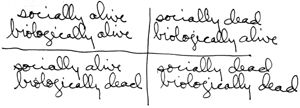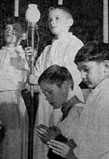
|
Present
Past
Subjects
Projects
Misc

|
THE DEMOCRACY OF SELF
(Notes for a talk on the Democracy of Self, part of a series of lectures entitled 'Democratic Design' held in Casco Utrecht, 11.02.01.)
Some Observations
I am a user. A user of language. A user of ideas and representations. An adherent. An addict. A smell eater. A dilettante. Desirous. I find ideas useful. I use ideas to build meaningful models of the world. I use models of the world to construct an image of myself. I believe that none of the ideas, models, representations that I use comes from myself. Not even my idea of myself comes from myself. My self is constructed from the materials that I collect. As an artist I am interested in how this works. At the moment I observe my own self construction in two ways: sequentially, as a narrative, a train of thought, a road trip, a hop-skip-and-jump from one (fragmentary) idea to the next; and 'vertically,' as the construction of a single timeless image, a hybrid, the perfect 'combining from here and there of the bearers of significance.' Both ways are a search for completion, for closure. But only one of these ways can be executed at a time. Thus I find myself experiencing a constant struggle decision-wise between looking for the right word and telling the right story. I don't believe in democracy. As an artist I am by definition an outsider. By the same definition I am in the minority. An artist in the minority in a democracy has no right. So what about the democracy of self? My point is this: if the Other is democratic then the Self must be too. (Given the existential co-arising and co-dependency of the two.) It should be obvious that each of the terms, Self and the Other, as well as the terms existence and non-existence are completely relative. Everything depends on one's orientation and attachments. In my recent work I've been considering the implications of this idea. And what happens to the self (the experience) when there is a sudden change in one's orientation.
.
Adherent -
|
adherent, n. A follower who has not yet obtained all he expects to get.
(Ambrose Bierce: The Devil's Dictionary)
|
.
Being-Alone and Being-With -
|
... the paradoxical characteristic of existence is always finding ourselves inescapably alone and at the same time inescapably in a world with others...
Our sense of aloneness and individuality is only conceivable in the light of our constant co-existence with other human beings, and we can only be together with others and participate in their lives because we and all others are in fact distinct individuals.
(Stephen Batchelor: Alone with Others -- An Existential Approach to Buddhism)
|
.
Condensation-Displacement -
|
According to Freud, the two primary operations of dream-work are condensation and displacement. Condensation is the process where composite figures are formed by uniting or superimposing various features of two or more elements into one single dream-image. Displacement is the process where figures in the dream replace other figures via a chain of association.
(Steve Kerby: Notes Toward a Reading of Jacques Lacan)
|
.
Death -
Death basically comes in two flavors: the Biological (subjective-internal) and the Social (objective-external). These two flavors produce a matrix of four possible positions. At any one moment one is either...

As you can see from this matrix, death is relative. Orientation is everything. When we lie down we see things differently -- what we saw previously as horizontal now becomes vertical, metonymy becomes metaphor, time becomes space.

See: Metonymy-Metaphor
.
Democracy -
The right of the majority over the minority.
A form of government. A form of self-government. - The religion of humanity.
See: Being-Alone and Being-With
See: Sense of Self
.
Experience -
.
Metonymy-Metaphor -

|
Roman Jakobson demonstrated that all speakers and writers employ two diametrically opposed linguistic functions: metonymy and metaphor. Metonymy operates whenever we combine words in order to construct a sentence, whenever we link together subjects, predicates, nouns, pronouns, adjectives, adverbs and the like in such a way as to form a meaningful sequence. It is useful to think of this operation of combination as horizontal. Metaphor operates whenever we select, whenever we choose a particular word from the available inventory of the language. It is useful to think of this operation of selection as vertical.
(Steve Kerby: Notes Toward a Reading of Jacques Lacan)
|
Think vertical: space.
Vertical metaphors: upright, consciousness, health, life, strong force, high status, good.
Think horizontal: time.
Horizontal metaphors: lying down, unconsciousness, sickness, death, weak force, low status, bad.
See: Condensation-Displacement.
.
Mirror Stage -
|
According to Lacan, the uncoordinated infant, helpless and dependent upon the mother, first becomes aware of its body as a whole by identifying his own image with an image outside himself, be it an actual mirror or simply the image of another child. But this image of wholeness is an imaginary one. Actually, the infant is helpless and fragmented. Lacan believes that the formation of the ego begins with the infant's constructed imaginary image of itself. And since this image of wholeness occurs in something other, something apart from where we 'are,' (the mirror, another child), this imagining serves rather well as a metaphor for understanding the beginning of the alienation of the (constructed) human self. The ego (the self) is formed in the Other, constructed by an alien identification, based on an initial lack of wholeness in the body.
(Steve Kerby: Notes Toward a Reading of Jacques Lacan)
|
.
Prior State -
Also known as life. One of the four states or 'phase changes' described by Tibetan Buddhism, the other three being Death, Intermediate State (the bardos), and Rebirth. The 'prior-ness' of the Prior State refers to this existence 'prior to our next death.'
The Tibetan view of life: an opportunity to prepare for the next journey through the bardo state. (S. Grof)
Another way of looking at existence as Prior State:
|
Ontologically, 'birth' should not be restricted to denoting the physical act of being born, but needs to be understood as our ever-present rootedness in the given and inalterable structures of our past.
(Stephen Batchelor: Alone with Others -- An Existential Approach to Buddhism)
|
.
Sense of Self -
What Dennett (among others) calls the 'benign user illusion' and the 'center of narrative gravity.'
|
There is no 'I' who 'holds' opinions. There is a body that says "I believe in being nice to people," and a body that is (or is not) nice to people. There is a brain that can store knowledge of astrology and the tendency to talk about it, but there is not in addition a self who 'has' the belief. There is a biological creature who eats yoghurt every day but there is not in addition a self inside who loves yoghurt...
...The self is a vast memeplex -- perhaps the most insidious and pervasive memeplex of all. I shall call it the 'selfplex'. The selfplex permeates all our experience and all our thinking so that we are unable to see it clearly for what it is -- a bunch of memes. It comes about because our brains provide the ideal machinery on which to construct it, and our society provides the selective environment in which it thrives.
(Susan Blackmore: The Meme Machine)
|
.
Smell Eater -
|
smell eater, n. being of the intermediate state who rushes about seeking a birthplace, odours [for nourishment] and so forth.
(Yang-jen-ga-way-lo-drö: Death, Intermediate State, Rebirth)
|
.
Stephen Toulmin -
In The Inwardness of Mental Life, Stephen Toulmin argues that our 'mental life' (our inner dialogue, our minds, our languaging self) begins outside of our bodies.
.
User -
|
user, n. (law). Continued use or enjoyment of a right to use; (1) right to use, (2) presumptive right arising from use.
(OED)
|
ALAMUT.COM is artist owned and operated.
Mail: current address.

|

|




